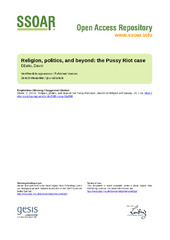Приказ основних података о документу
Religion, Politics, and Beyond : The Pussy Riot Case
| dc.creator | Džalto, Davor | |
| dc.date.accessioned | 2017-11-01T10:17:31Z | |
| dc.date.available | 2017-11-01T10:17:31Z | |
| dc.date.issued | 2013 | |
| dc.identifier | 1522-5668 | |
| dc.identifier.uri | http://rifdt.instifdt.bg.ac.rs/123456789/1152 | |
| dc.description.abstract | The recent case of the Russian punk group Pussy Riot, their performance in Moscow Cathedral and the subsequent legal actions against them, have highlighted many important issues that Russian society faces today. However, this case can also be the basis for a more general analysis of the relations of religion and politics and the political dimension of Orthodox Christianity. Examining the relationship between religion and politics can point to two important elements that both religion and politics, in their institutional manifestations, share: 1) the “will to power,” and 2) the communitarian dimension of human existence. In order to fully understand the paradoxical position of Christianity in respect to politics and state, it is necessary to differentiate between “eschatological” and “historical” Christianity. | eng |
| dc.format | 15/2013 (2013) 1-14 | |
| dc.language | en | |
| dc.rights.uri | https://creativecommons.org/licenses/by-nc-nd/4.0/ | |
| dc.source | Journal of Religion and Society | eng |
| dc.title | Religion, Politics, and Beyond : The Pussy Riot Case | eng |
| dc.type | article | |
| dc.rights.license | BY-NC-ND | |
| dcterms.abstract | Джалто, Давор; | |
| dc.citation.spage | 1 | |
| dc.citation.epage | 14 | |
| dc.type.version | publishedVersion | |
| dc.identifier.fulltext | http://rifdt.instifdt.bg.ac.rs/bitstream/id/12939/Dzalto-Religion_politics_and_beyond_the.pdf | |
| dc.identifier.rcub | https://hdl.handle.net/21.15107/rcub_rifdt_1152 |

